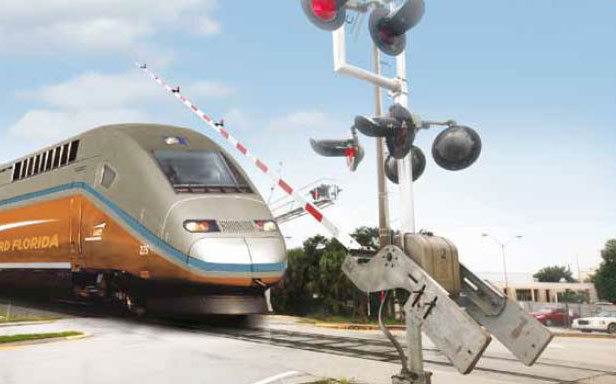
VERO BEACH — Former Vero councilman Ken Daige has been selected by his fellow board members as chairman of Vero’s new High-Speed Rail Advisory Commission.
Don Croteau, who represents the city’s planning and zoning commission, was selected as vice-chair. Nominations were taken after each member briefly introduced themselves.
Other commission members are Indian River County Chamber President Penny Chandler, attorney and Indian River Shores resident Kiernan Moylan, former Vero councilman Brian Heady and, as an alternate, Main Street Vero Beach board member and local CPA Scott Stradley.
Assistant City Attorney Peggy Lyon gave the board a briefing on Florida’s Sunshine Laws governing open meetings and public records, noting that she was dealing with a board experienced in abiding by the law.
“I’m looking at a group of people who are very knowledgeable about the Sunshine Law and very proactive,” Lyon said.
City Attorney Wayne Coment acknowledged that there had been some confusion about All-Aboard Florida representative Russell “Rusty” Roberts because he had been on some of the commission documents as a non-voting member. But Coment stated that Roberts is not any kind of member of the commission.
Roberts sat in the audience section of the council chambers and approached the podium just as any member of the public would do. He had applied to be on the commission but did not qualify because he does not live in Indian River County.
Though Roberts said the railroad would pay for all upgrades to the tracks and intersections themselves, if the city wants designated “quiet zones” at any or all of the crossings to avoid horns blasting through the city while the train passes at high speeds, the city would bear that cost.
Roberts said the city must make decisions in the next 12 months about options for quiet zones and closing crossings.
“I would say that 2014 is the year that these decisions must be made,” Roberts said, adding that the quiet zone improvements must be made while the railroad is working in the corridor and that should begin to happen in the second half of 2014.
It was estimated that the wider State Road 60 crossing quiet zone would cost $600,000 and the more narrow quiet zones would cost roughly $400,000 each.
The construction, which could cost the city $3 million or more for the seven intersections, would be in addition to any engineering and design costs.
“You’re going to need to get an engineering study and to hire that engineer is not the railroad’s responsibility,” Roberts said.
The city’s budget is set through Sept. 30 and the budget process has not yet begun for 2014-15. Squeezing an extra $3 million out of the city’s $20 million budget in one year for quiet zones would be a big stretch.
Other than electing a chair and vice chair, the commission took two actions on Thursday on motions made by Chandler.
By a unanimous vote, they directed the city staff to bring back any existing traffic counts or studies done on the intersections with train crossings, especially the “one-way” crossing from U.S. 1 to 14th Avenue, which could be closed in preparation for the high-speed train.
By a 4-1 vote with Heady dissenting, the group also agreed to recommend to the city council that Vero join with the City of West Palm Beach in working to get some state funding to offset the potential cost of the quiet zones. Funding might come from state gas tax receipts or other transportation funds.
Moylan, who has experience working with similar projects on a federal level, said Vero should apply for these funds because if the city misses the opportunity, the dollars will end up going to another community.
Heady said he was concerned about the expenditure of any taxpayer dollars, from the state or any government agency, on safety upgrades for the All-Aboard Florida project.
The commission will meet again at 3 p.m. Jan. 22 in council chambers at city hall.



